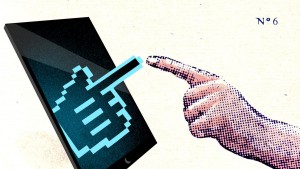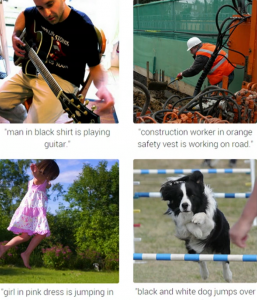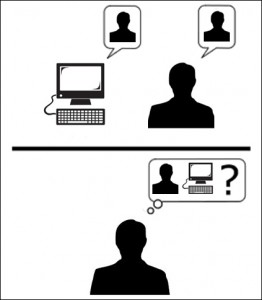The robots are coming, and they’re coming fast. In this fascinating Fresh Air interview, tech writer John Markoff talks about several ways that intelligent machines are likely to profoundly change our lives over the next few years. From self-driving cars to peopleless warehouses, intelligent machines will play major roles in shaping our world. He makes a critical distinction between artificial intelligence (AI) and intelligence augmentation (IA), two schools of research that take radically different approaches to the relationship between humans and machines. As a bonus, the interview ends with what is probably the funniest robot song ever recorded.
npr.org/sections/alltechconsidered/2015/08/20/433000643/how-close-are-we-really-to-a-robot-run-society
Category: -Cross Currents
We generally think about digital technology as something that’s outside of us. I think there’s a clear boundary between me and my technology. But that boundary is getting fuzzier all the time. In this fascinating talk to the Long Now Foundation, science fiction writer Ramez Naam makes a compelling case that the boundary is about to disappear forever. He discusses cutting edge research in many related fields and the ethical implications of that research as it finds its way into our products and our bodies.
The Long Now Foundation hosts an excellent series monthly talks related to its important mission of helping us see the long view; this is part of that ongoing series. While you’re on their site, take some time to look for other gems.
Shaming and bullying existed long before the Internet age. But social networks have the power to magnify the negative impact of those activities, sometimes wrecking the lives of innocent people in the process. In this fascinating TED talk, Jon Ronson graphically illustrates this phenomenon with a true story and talks about what we need to do to minimize the consequences of Internet shaming.
[iframe id=”https://embed-ssl.ted.com/talks/jon_ronson_what_happens_when_online_shaming_spirals_out_of_control.html” align=”center” mode=”normal” autoplay=”yes” aspect_ratio=”4:3″ maxwidth=”720″]
Facebook made lots of headlines a few months ago when people discovered that their news feeds had been manipulated for research purposes. Many people were shocked that they’d been unwitting participants in massive social science studies. But similar research at Facebook has also been used to help the company to determine how to best help customers deal with unwanted posts. This Radiolab program explores the light and dark sides of Facebook’s gigantic social engineering projects.
www.radiolab.org/story/trust-engineers/
 This is a big question with a multitude of answers. NPR’s new program/podcast Invisibilia answers with three stories. The first one looks at the big picture with questions about artificial intelligence, wearable computers, and the possibilities for human/computer co-evolution. The other two stories look at specific, personal, right-now examples of human character changes as a result of digital technology.
This is a big question with a multitude of answers. NPR’s new program/podcast Invisibilia answers with three stories. The first one looks at the big picture with questions about artificial intelligence, wearable computers, and the possibilities for human/computer co-evolution. The other two stories look at specific, personal, right-now examples of human character changes as a result of digital technology.
npr.org/programs/invisibilia/385792677/our-computers-ourselves
 For decades researchers have experimented with machine learning—software that can improve with experience without being reprogrammed. That research has paid off in a number of applications, including the intelligent search engines that we use every day. But recent breakthroughs in a field called deep learning are likely to bring radical transformations to our lives very soon. This TED Talk by Jeremy Howard explains the technology and touches on a few applications and implications. Spoiler: there’s good news and bad news….
For decades researchers have experimented with machine learning—software that can improve with experience without being reprogrammed. That research has paid off in a number of applications, including the intelligent search engines that we use every day. But recent breakthroughs in a field called deep learning are likely to bring radical transformations to our lives very soon. This TED Talk by Jeremy Howard explains the technology and touches on a few applications and implications. Spoiler: there’s good news and bad news….
[ted id=2155 lang=en]
The digital technology explosion of the last decade has produced many new threats to our privacy, including some unexpected ones. In this short TED talk, Catherine Crump explains how the automatic license plate scanners used by police might have disastrous ramifications for law-abiding citizens.
[ted id=2149]
 You may have heard the headlines: a computer passed the Turing test, fooling some judges into thinking it was a human. This short piece by NPR’s Goeff Nunberg puts the event into perspective, explaining why he believes that the machines we use aren’t anything like the compelling operating system portrayed by Scarlett Johansen in the film Her.
You may have heard the headlines: a computer passed the Turing test, fooling some judges into thinking it was a human. This short piece by NPR’s Goeff Nunberg puts the event into perspective, explaining why he believes that the machines we use aren’t anything like the compelling operating system portrayed by Scarlett Johansen in the film Her.
npr.org/blogs/alltechconsidered/2014/07/01/323984864/do-feelings-compute-if-not-the-turing-test-doesnt-mean-much
Every new technology brings controversy. This short video poetically confronts one of the most important questions of our digital age: If we’re always connected through our devices, will we lose more important connections with other humans?
Millions of people have viewed it online. Do you think it will make a difference in how they view their technological tools?